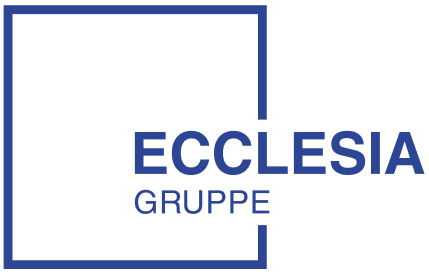
Risk management transcends industry boundaries
Frankfurt/Main (ecc). Whether it's an abnormal load or an emergency rescue – there are major overlaps in risk management and issues that can be transferred from one industry to another. This was the result of the first Ecclesia symposium on cross-industry risk management, which took place at the “The Squaire” office and conference center at Frankfurt Airport. Experts reported on their experiences to around 100 risk managers from various companies at the invitation of Germany's largest insurance broker for companies and institutions.
Speaking of the “human factor”: Even the most seasoned pros who set the standards for their industry are not immune to risks in their work. Sabine Baumann-Duvenbeck, managing director of the heavy haulage company Viktor Baumann, spoke about this, using an accident during a complex heavy haulage operation as an example. This applies above all when routine takes over. The company immediately drew consequences from the failed transport: checklists were improved. Technical risk prevention was expanded by means of new devices that measure the angle of inclination of the transported goods during the journey. Baumann, the heavy-duty specialist, has also broadened the knowledge base of its employees: the respective specialists for transport, crane operation and assembly are given more insight into the neighboring fields of work, because, as is well known, four or six eyes see more than two.
This is one aspect of teamwork that Dr. Saša Sopka, an emergency doctor at the University Hospital of the RWTH Aachen, developed further. During a rescue operation, people who may never have seen each other before have to work together – and in a situation that is often enough completely unclear or can develop dramatically. The anesthetist and head of the Center for Interdisciplinary Training and Patient Safety at the University Hospital Aachen presented communication requirements and rules that not only protect the people to be treated, but also the emergency services themselves from risks. “This cooperation must be practiced again and again,” he said. Furthermore, at the end of an operation, it is important not only to look at potential mistakes, but also to discuss together what went really well: “That is safety culture.”
What awareness of safety issues is in everyday life, resilience is in the way societies operate. In his presentation, Sönke Marahrens, a colonel in the German armed forces who works at the European Counter Hybrid Intelligence Center in Helsinki, called for more societal resilience against such threats, thereby taking the topic of risk management to a new level. Ultimately, he said, we have to be aware that there are states in the world that hope to profit from instability or that benefit from social divisions in Western democracies. That is why they are trying to gain influence through disinformation campaigns, cyber attacks, but also through more or less covert economic activities. “We must not close our eyes to these issues,” said Sönke Marahrens. “Resilience is a task for society as a whole.” Among other things, it is about better protecting critical infrastructure.
Dr. Frank Schumacher, managing director of a special-purpose association of several municipalities that operate a residual waste heating plant near Böblingen, also called for a new social awareness of risk. His plea: waste is tomorrow's raw material, and it would be an immense loss to the economic cycle if it were no longer collected. The recycling possibilities have not yet been exhausted, but Dr. Schumacher also pleaded for not closing one's eyes to reality. The thermal recycling of waste and the provision of new energy must also be included in the debate without blinkers.
Agaplesion, the health service provider, is pursuing professional risk management for the care of the very elderly, reported Bettina Geißler-Nielsen, head of process and quality management. This includes an intensive examination of the biography of each patient in order to better understand their behavior, concerns and fears. Bettina Geißler-Nielsen chose an impressive way of doing this: she stood in front of the guests at the Ecclesia symposium wearing a walker and told the story from the perspective of an old lady. “Biographical work is very important. It helps people feel accepted, while at the same time increasing understanding of their behavior, making it easier for the care team,” she explained. “It also activates those in need of care and strengthens their skills. Prevention also means letting them do it themselves,” emphasized the nurse.
Risk management includes prevention work as well as active crisis management. Dr. Hartwig Schlesiger, Head of Global Site Services at LANXESS Deutschland GmbH, took up this aspect and reported on active crisis management that takes place in three phases: at the beginning, the critical event and its consequences must first be understood. Then structures are created to manage the situation. At the end of the crisis, the aim is to return the processes to normal mode. “In everything, there needs to be a person in charge who is in charge,” he summarized.
The insurance industry is also attaching increasing importance to proactive crisis management. This became clear in the concluding panel discussion, which was led by Holger Wendorff, Managing Director of deas Deutsche Assekuranzmakler GmbH, with Dr. Alexander Mahnke, Chairman of MSIG Insurance Europe, and Glenn van Mele, Managing Director of HDI Risk Consulting GmbH. Glenn van Mele summarized that the trend is moving from “repair and reimburse” to “predict and prevent”. Dr. Alexander Mahnke promoted partnership: “Insurers are part of industry's risk management.” In the end, satisfactory solutions for customers can only be achieved through dialogue, emphasized Holger Wendorff.
Partnership and dialogue across industries: Dr. Peter Gausmann, initiator of the first Ecclesia symposium, considered the event a success. It had become very clear that cross-industry exchange on risk management was beneficial for all sides. “We will continue this series,” promised the managing director of GRB Gesellschaft für Risiko-Beratung, which belongs to the Ecclesia Group.
For further information, please contact:
Thorsten Engelhardt
Spokesman Ecclesia Group
Ecclesiastraße 1 - 4
32758 Detmold
Phone: +49 5231 603-6912
Fax: +49 5231 603-606912
Mobile: +49 151 28800245
